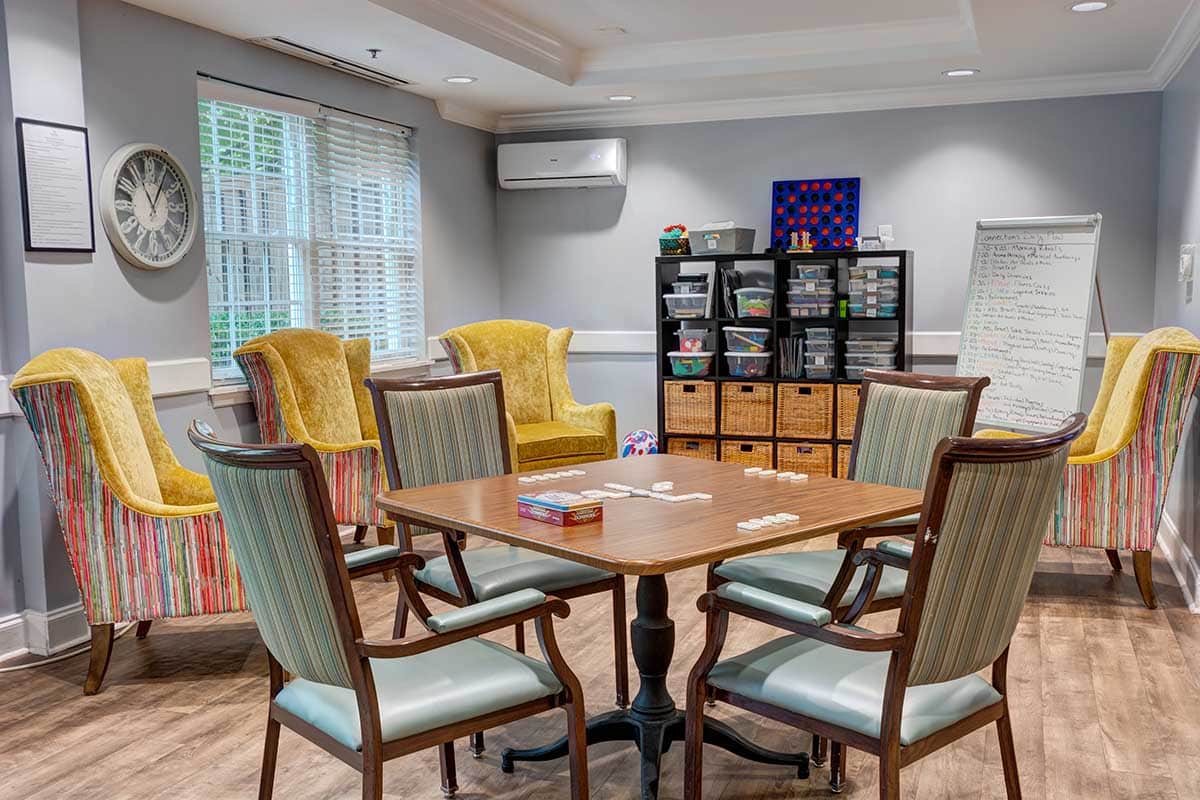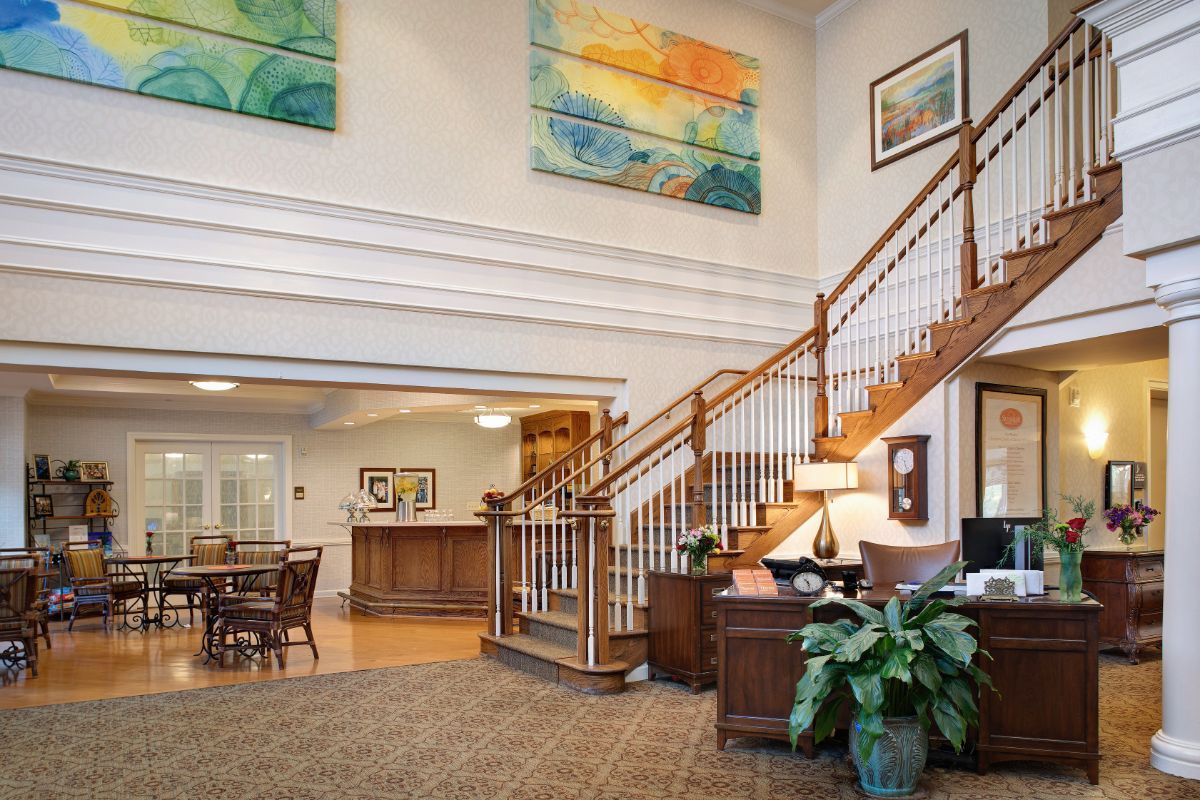Boutique Memory Care That Feels Like a Custom Sanctuary
Boutique Memory Care That Feels Like a Custom Sanctuary
Blog Article
Everything About Memory Treatment Solutions: Why Tiny Memory Care Houses Are a Fantastic Selection
Memory treatment services play a crucial duty in supporting individuals with Alzheimer's and dementia. Little memory care homes stick out for their customized strategy and intimate setting. With reduced staff-to-resident ratios, these homes promote more powerful links and customized treatment. Citizens gain from enhanced social communications and a secure environment. As households explore choices, understanding the special benefits of little memory treatment homes ends up being essential. What factors should be considered when picking the right home?
Recognizing Memory Treatment Services
While lots of may know with general senior treatment options, understanding memory care services is essential for families facing the obstacles of cognitive decrease. Memory treatment specifically satisfies individuals with conditions such as Alzheimer's condition and other forms of mental deterioration. These solutions supply an organized setting that concentrates on improving the lifestyle for citizens with specialized treatment and support.Memory care centers are developed to assure safety and security and safety and security, usually including secured atmospheres to protect against wandering. Educated employee are available all the time to aid with day-to-day activities, medicine management, and personal treatment. In addition, memory treatment programs often include cognitive stimulation activities, customized to engage homeowners and advertise mental health. Households can take advantage of comprehending these services, as they make it possible for notified decisions regarding their loved ones' care, making certain that their particular demands and choices are resolved in a helpful and caring fashion.
The Benefits of Tiny Memory Treatment Residences
Little memory treatment homes provide distinctive benefits that can greatly boost the lifestyle for homeowners with cognitive impairments. One considerable advantage is the intimate atmosphere, which enables customized communications among staff and residents. This smaller sized setting fosters purposeful relationships, reducing feelings of isolation and anxiety commonly experienced by people with memory issues.Additionally, the lower staff-to-resident ratio in small memory treatment homes allows caregivers to supply more alert guidance and assistance. This technique not only improves security yet also advertises a feeling of protection for the residents.Moreover, small memory treatment homes can adapt rapidly to the unique demands and choices of each local, allowing for an extra homey atmosphere. Such an environment can motivate social engagement and engagement in activities, eventually enriching the day-to-day experiences of those coping with cognitive impairments.
Personalized Care Program for Homeowners
Personalized care plans are important in memory care homes, as they cater to the special needs and choices of each resident. These plans begin with extensive assessments performed by competent specialists, that evaluate cognitive capabilities, case history, and personal interests. This tailored method assurances that care is not just reliable yet additionally respectful of each individual's self-respect and autonomy.Moreover, customized treatment strategies are flexible, enabling adjustments as homeowners' demands evolve over time. This adaptability fosters a complacency and knowledge, which is necessary for people living with memory obstacles. Caregivers are educated to execute these plans constantly, providing support that straightens with the homeowners' regimens and preferences.Ultimately, individualized care plans improve the high quality of life for locals by advertising health, self-reliance, and interaction, making them a fundamental element of memory treatment services in small memory treatment homes.
Producing a Home-Like Environment
Developing a home-like environment is critical for promoting comfort and experience in memory care setups, as it considerably affects residents' psychological wellness. Small memory treatment homes commonly focus on personalized touches, such as cozy shade combinations, family images, and familiar furnishings setups, which aid citizens really feel a lot more secure. Integrating aspects similar to a conventional home, like cozy home and public areas, urges a feeling of belonging.Moreover, using all-natural light and exterior rooms can boost the ambience, promoting relaxation and serenity. Team member play a significant duty in maintaining this setting by engaging with citizens in a thoughtful way, treating them like family. Routine activities, such as food preparation or horticulture, can also add to a home-like feeling, using chances for residents to take part in purposeful experiences. In general, producing a nurturing environment sustains cognitive function and psychological security, making it a vital element of memory care services.
Enhanced Social Communication and Neighborhood
Boosted social communication and neighborhood are vital components of memory care services. By fostering individualized social involvement and creating a family-like environment, these services advertise significant connections among citizens. Group activities and occasions further motivate participation, helping people really feel more included and supported.
Individualized Social Interaction
While social communication is crucial for general health, many individuals with memory problems commonly have a hard time to involve meaningfully with others. Customized social involvement in memory treatment homes addresses this challenge by producing customized activities that accommodate homeowners' unique interests and abilities. By concentrating on specific preferences, caregivers can foster links that resonate deeply with each person. check it out Tasks such as art therapy, songs sessions, and directed discussions advertise cognitive stimulation and psychological expression. Additionally, tiny group settings motivate camaraderie and permit for more intimate interactions, enhancing sensations of belonging. This strategy not just battles feelings of isolation yet additionally empowers residents to keep a sense of identification, inevitably adding to boosted psychological health and lifestyle.
Family-like Ambience
In a memory treatment setting, cultivating a family-like ambience substantially improves social interaction and builds a feeling of community among residents. Smaller sized memory treatment homes commonly prioritize intimate settings, enabling homeowners to create closer connections with each other and team member. This nurturing ambience promotes trust, which is vital for individuals with memory problems. Locals are most likely to involve in discussions and share experiences, developing a supportive network that alleviates feelings of isolation. The familiarity of shared areas and regimens adds to a sense of belonging, even more urging social interaction (personalized memory care). In such settings, psychological bonds prosper, resulting in boosted overall health and a higher quality of life for locals as they navigate their day-to-day experiences together
Group Activities and Events

Safety and Protection Functions in Tiny Residences
Many tiny homes developed for memory treatment incorporate important safety and safety functions to assure the well-being of locals. These homes usually make use of secure access and departure indicate stop roaming, an usual concern among individuals with memory disabilities. Furthermore, monitoring systems and alarm system mechanisms enhance monitoring, guaranteeing that team can without delay reply to any type of uncommon activities.Interior designs are tailored for safety, with minimized hazards such as sharp corners and clutter-free paths. Handrails and non-slip flooring are normally installed to decrease the risk of falls. Personnel are learnt emergency procedures, guaranteeing they are prepared for various situations.Moreover, customized treatment strategies might include assessment of private safety requirements, providing tailored solutions for each citizen. In general, these safety and protection attributes develop a caring atmosphere where citizens can thrive while maintaining their dignity and self-reliance.
Just how to Select the Right Memory Care Home
Just how can families ensure they pick the most suitable memory treatment home for their loved ones? The choice requires cautious factor to consider of a number of variables. Initially, family members ought to examine the facility's staff certifications and training, ensuring that caretakers are experienced in managing memory-related conditions. Next, it's vital to evaluate the home's setting, concentrating on security functions and whether it promotes a sense of neighborhood and belonging. Going to the facility can offer insight into everyday tasks and the social environment, which are vital for psychological stimulation and emotional wellness. Furthermore, families should make inquiries about the treatment strategies supplied, ensuring they are customized to specific requirements. Thinking about the home's place and accessibility for family members sees can add to a smoother change. By addressing these aspects, households can make an enlightened choice that prioritizes click this link their loved one's convenience and lifestyle in a memory care setting.
Frequently Asked Inquiries
What Qualifications Should Personnel Members in Memory Care Homes Have?
Staff participants in memory treatment homes need to have pertinent accreditations, experience in dementia care, strong interaction skills, and compassion. Ongoing training in behavior monitoring and restorative treatments enhances their capability to support homeowners effectively.
How Do Memory Treatment Provider Differ From Conventional Assisted Living?
Memory treatment services focus specifically on individuals with memory impairments, offering specific assistance and organized environments. On the other hand, traditional assisted living offers general support with day-to-day activities, lacking the tailored technique required for those with cognitive obstacles.
What Sorts of Tasks Are Used in Memory Care Houses?
Memory treatment homes commonly offer a variety of activities developed to engage residents. Usual alternatives consist of art therapy, music sessions, cognitive video games, workouts, horticulture, and get-togethers, all aimed at improving wellness and cognitive feature.
Can Citizens Bring Their Own Items to Memory Care Homes?
Residents can usually bring their very own possessions to memory treatment homes, allowing them useful site to individualize their living area - personalized memory care. This technique aids produce an acquainted environment, advertising comfort and a feeling of identity for the individuals

Just How Are Relative Involved in the Care Refine?
Family participants play an essential duty in the treatment process, typically joining decision-making, participating in treatment conferences, and offering psychological assistance. Their involvement cultivates a joint environment, enhancing the homeowner's overall well-being and quality of life. While several may be familiar with basic senior care alternatives, comprehending memory treatment services is essential for family members encountering the challenges of cognitive decrease. These services supply a structured setting that focuses on enhancing the high quality of life for residents through specialized treatment and support.Memory treatment centers are created to ensure safety and protection, typically including protected environments to protect against roaming. Customized care strategies are essential in memory treatment homes, as they provide to the unique requirements and choices of each homeowner. Personnel participants in memory care homes must possess pertinent certifications, experience in dementia treatment, solid communication abilities, and concern. Memory treatment solutions focus particularly on people with memory impairments, offering specific assistance and organized atmospheres.
Report this page